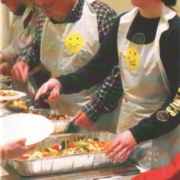For years, many of you have experienced the wonderful musical programming and Shabbatot at the synagogue, and you know that in one week from now it’s Shabbat Shira, the “Sabbath of Song,” celebrating the rich and vibrant traditions of Jewish music in worship and Jewish culture.
For some, Shabbat Shira might be a bit of a foreign term. So, I thought I’d give a brief overview of the origin of Shabbat Shira and what you can look forward to next weekend at Holy Blossom.
Shabbat Shira, or the “Sabbath of Song,” is associated with next week’s Torah portion, B’shallach, which commemorates the miraculous parting of the Red Sea. It’s aptly named because within this portion is Shirat Hayam, the “Song of the Sea,” which the Israelites sang after crossing the sea of reeds. The famous prayer Mi Chamocha is derived from this biblical narrative, and the text often appears visually as waves or bricks, symbolizing both the Israelites’ journey to freedom and the miracle of crossing the sea. There’s a special melody used exclusively when chanting this section of the Torah—it’s joyful, lively, and can even be heard in the Disney film The Prince of Egypt.
There are also lesser-known customs for Shabbat Shira, including feeding the birds just before this Shabbat. Birds are said to be the true masters of song, and our rabbis teach us that even the birds joined in singing Shirat Hayam, playing the role of angels in this jubilant chorus.
In many synagogues, Shabbat Shira has become an opportunity for a musical extravaganza, whether as part of services or with a special musical event. I like to think that every Shabbat at Holy Blossom is, in a way, Shabbat Shira, as we don’t wait for this special Shabbat to incorporate and experiment with wonderful music in our services.
That said, we do mark Shabbat Shira with some special musical moments every year. This year will be no different, and I hope you’ll consider attending one (or more!) of the following:
- Friday February 7: Our regular and very musical Kabbalat Shabbat service in the Mishkan at 6:00 PM.
- Saturday February 8: The theme will be gratitude. We’ll feature our Temple Singers, and Lindi and I will offer a sermon-in-song on various musical settings of the Modim prayer, which expresses gratitude.
- Sunday February 9: I encourage you to take an hour from your afternoon (you’ll still be home in plenty of time for the Super Bowl!) and join us for a special concert by the professional opera company, Opera Atelier. They will perform excerpts from Marc-Antoine Charpentier’s opera David and Jonathan, which will have a short run at Koerner Hall in early April. The opera, originally premiered in Versailles, is a timeless biblical masterpiece you won’t want to miss. The one-hour concert will be followed by a brief and elegant dessert reception in our atrium, where you’ll also have the chance to meet some of the production’s dancers. I’m fortunate to be singing a few selections and will also be offering a “pre-show” lecture on Music and the Psalms at Koerner Hall on April 9.
On a more personal note, I’d like to take a moment to share some gratitude. On December 21, Ilyse and I were blessed to have our son, Joel, called to the Torah as a Bar Mitzvah on the Holy Blossom Bima. I want to extend a personal thank you to the clergy, professional team, and our entire Temple community for your support and generosity during this time. Planning a simcha for 200 of your closest family and friends is challenging enough, but adding a few hundred congregants from two synagogue communities really took it to another level! We could not have imagined a more wonderful scenario, and we’re deeply grateful to our Holy Blossom family for the way you embraced our guests during their time with us.
A special thank you to my clergy team, who generously shared the bima; to Rebekah Lobosco Gilli, Simcha & Venue Manager and Iris Spitz, Cantorial Administrative Assistant, for their help in making the celebration so beautiful; and to our facilities team, who always go above and beyond to make incredible things happen in our building.
Many of you were also incredibly generous, and I’m proud to share that both the Danforth Jewish Circle and Holy Blossom Temple benefited from Joel’s Bar Mitzvah. I’m humbled to report that $4,000 was donated to the Claudia Bell education fund at DJC, and over $8,000 was contributed to the Music@HBT fund in honor of Joel becoming a Bar Mitzvah. Joel chose these charities because they are close to his heart, and he is currently writing thank-you cards to everyone who contributed. Joel has started his next Jewish journey having taken on tutoring his first private Bar Mitzvah student a few weeks ago. We’re hoping they’ll be more, perhaps he’ll even have the opportunity to work with your child or grandchild in the near future!
Thank you once again, and may we go from strength to strength, celebrating many more beautiful simchas together in the years to come.

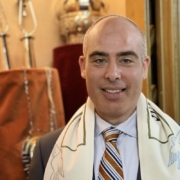
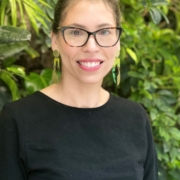
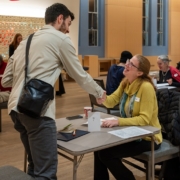
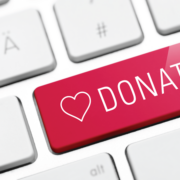
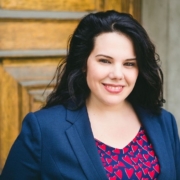
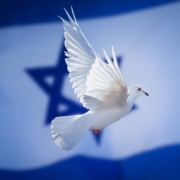
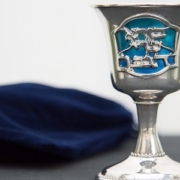
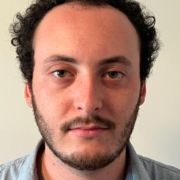 I am a fellow member of Holy Blossom and a passionate museum enthusiast. My love for museums inspired me to pursue a career in the field, earning a degree in Museum Studies with a focus on collections and research. This journey began with a BA in Anthropology and Art History from UBC and continued with a Master’s in Provenance Studies from the University of Glasgow. To contribute to our wonderful community, I have volunteered to assist in developing a new exhibition for the Living Museum at Holy Blossom. As part of an upcoming exhibition project for the Living Museum dedicated by George z”l and Susan Cohon and Family, we are reaching out to ask if members of our congregation would be willing to loan their Kiddush cups for display.
I am a fellow member of Holy Blossom and a passionate museum enthusiast. My love for museums inspired me to pursue a career in the field, earning a degree in Museum Studies with a focus on collections and research. This journey began with a BA in Anthropology and Art History from UBC and continued with a Master’s in Provenance Studies from the University of Glasgow. To contribute to our wonderful community, I have volunteered to assist in developing a new exhibition for the Living Museum at Holy Blossom. As part of an upcoming exhibition project for the Living Museum dedicated by George z”l and Susan Cohon and Family, we are reaching out to ask if members of our congregation would be willing to loan their Kiddush cups for display.